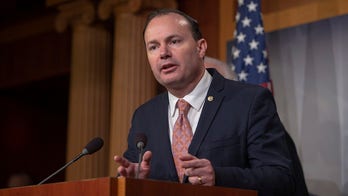
SACRAMENTO, Calif. - The California Senate has shut down for the night after failing to approve a stopgap plan to stave off the need for IOUs and ease the state's $24.3 billion budget deficit.
Lawmakers there were among many around the nation who went up against a midnight deadline as the fiscal year ended for many states.
Legislators in more than a half-dozen states met in around-the-clock budget sessions as they struggled to avoid government shutdowns and other painful cuts, with the most dramatic negotiations unfolding in California.
The end of June marks the end of the fiscal year in many states, meaning lawmakers worked late Tuesday evening to pass budgets in a year that has seen the recession take a devastating toll on government finances.
In California, the budget mess threatened to cause fallout nationwide because of the sheer size of the state's economy. The Senate rejected three bills designed to save $5 billion, including $3.3 billion in education funding cuts that had to be enacted before the new fiscal year began Wednesday.
Senate President Pro Tem Darrell Steinberg, a Democrat, called Republicans' refusal to vote for the measures "an irresponsible position to take." At least two Republican votes were needed to put together the two-thirds majorities required to approve the legislation, which passed the Assembly last week with bipartisan support.
Arizona, Illinois, Indiana, Ohio, Connecticut, Mississippi and Pennsylvania were among the other states that raced against the clock to pass budgets -- and avoid crippling consequences.
Faced with a budget stalemate, the Ohio House voted in favor of a seven-day spending plan that will allow the state to keep operating while budget talks continue, the first temporary budget Ohio has been forced to approve in 18 years.
Indiana narrowly averted a large-scale government shutdown after coming to terms on a budget, and neighboring Illinois was likely to begin the new fiscal year without any plan for paying its employees or delivering government services. Government won't shut down without a budget, but lawmakers are faced with the biggest deficit in state history.
In Connecticut, Gov. M. Jodi Rell signed an executive order to keep the government running when the new fiscal year begins Wednesday, without a two-year budget in place. While she contends the average taxpayer won't notice any change, leaders of cities and towns fear delays in state grants that fund everything from road repairs to local education.
In Arizona, House lawmakers approved nine bills late Tuesday night to implement most of a compromise budget negotiated with Gov. Jan Brewer. But they omitted two controversial tax proposals, including a sales tax increase that Brewer has insisted on. The Senate followed by giving the same Republican-drafted bills preliminary approval.
Pennsylvania faced the prospect of not being able to pay state employees if they cannot resolve an impasse. State workers will receive only partial pay on July 17 and July 24, after which paychecks will be withheld entirely until the impasse is solved. They will then be paid retroactively.
Gov. Ed Rendell said 10 banks and credit unions have agreed to help 69,000 state employees by offering them low- or no-interest loans and lines of credit.
In most states, the debate centers on whether states should be raising taxes to bridge the budget gaps. California Gov. Arnold Schwarzenegger said he wouldn't sign anything that raised taxes or fees beyond what he has already proposed.
"They should forget about that," he said, accusing Democrats of going through a "song and dance. Let's get to work, fix it."
State Controller John Chiang has said he would have to start issuing the IOUs on Thursday unless lawmakers took steps to stem the state's red ink by then.
Roughly $3 billion worth of IOUs will be issued in July unless a compromise on closing the deficit is reached quickly. They will be sent to state contractors, college students, welfare recipients, low-income seniors, the disabled and others who depend on or deliver state services.
Counties will not get paid for social programs they administer.




